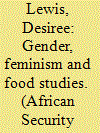| Srl | Item |
| 1 |
ID:
158985


|
|
|
|
|
| Summary/Abstract |
The poaching or the illegal harvesting of Abalone has for many years been endemic along South Africa's coastline and is the biggest threat to the continued survival of Abalone in the wild in its seas. Over the last 25 years, Abalone, once abundant, has been poached to the verge of commercial extinction. As a criminal enterprise Abalone poaching has become a well-planned, highly lucrative, illicit industry, controlled by organized crime syndicates, with large numbers of Abalone being harvested and poached illegally every year. Ninety-five percent of the poached Abalone in South Africa is smuggled out of the country to countries in South-East Asia, where it is a high-priced delicacy. This paper examines some of the factors driving the demand–supply dynamics, modus operandi, syndicate networks and smuggling routes concerning Abalone poaching in South Africa and the authorities’ efforts to combat it. Policing of this maritime crime presents its own set of obstacles and difficulties compounded by lack of funds; antipathy of communities dependent on Abalone poaching for economic survival; disbandment of special abalone anti-poaching task forces; high levels of corruption and even collusion between police and poaching syndicates.
|
|
|
|
|
|
|
|
|
|
|
|
|
|
|
|
| 2 |
ID:
142056


|
|
|
|
|
| Summary/Abstract |
Policy research and scholarship on food has rapidly increased in recent decades. The attention to ‘gender' within this work appears to signal important practical and academic efforts to mainstream gendered understandings of food consumption, distribution and production into expansive conceptualisations of human security. This article argues that the gender-related work on food has wide-ranging and often troubling political and theoretical foundations and implications. Often growing out of knowledge regimes for managing social crises and advancing neo-liberal solutions, much gender and food security work provides limited interventions into mainstream gender-blind work on the nexus of power struggles, food resources and globalisation. A careful analysis of knowledge production about gender and food is therefore crucial to understanding how and why feminist food studies often transcends and challenges dominant forms of scholarship and research on food security. This article's critical assessment of what food security studies in South Africa has entailed at the regional level and in global terms also focuses on the methodological and theoretical feminist interventions that can stimulate rigorous conceptual, research and practical attention to what has come to be understood as food sovereignty.
|
|
|
|
|
|
|
|
|
|
|
|
|
|
|
|